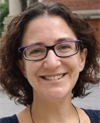
Students Julian Lopez, 12th grade, second left; Ben Montalbano, 11th grade, second right; and James Agostino, 12th grade, right; listen during their Advanced Placement (AP) Physics class at Woodrow Wilson High School in Washington, Friday, Feb. 7, 2014. (AP Photo/Charles Dharapak)
Secretary of Education Arne Duncan and District of Columbia Public Schools (DCPS) Chancellor Kaya Henderson are urging us to celebrate gains in the district’s standardized test scores and give credit for those gains to the use of student test scores to evaluate teachers.
But as a math teacher in a heavily minority, high-poverty high school, I’m not popping any champagne yet. The five-point overall fourth grade reading gain masks the fact that the improvement among higher-income students was quadruple that of their low-income counterparts, widening what was already a huge gap. I am even more troubled by the tiny two-point gain in reading for low-income fourth graders since 2009, which is dwarfed by a 19-point gain for their more advantaged peers.
I agree with Duncan and Henderson that zip code should not determine a child’s odds of school success. But it’s important to tell the hard, uncomfortable truth that it often does, and I see every day how DCPS policies make it harder, not easier, for my students to compete with their more advantaged counterparts.
My first year teaching was exhausting and frustrating. I stuck to what I had been told worked. I maintained high expectations, established classroom routines and created structure. But no matter how much effort I put into preparation, I was disconnected from my students. One day an agreeable kid told me I was “cool” but that, as a teacher, I was “the enemy.”
Much to my good fortune, our club allows me to explore how my students perceive class and life. Indeed, the purpose and utility of school is a recurring topic of discussion. Every imaginable reason has been proposed: to prepare students for a career, to ensure an informed electorate, to provide parents with a de facto daycare service, and, most commonly, “I don’t know.”
Effective instruction is difficult when a teacher and his or her students don’t agree on what the purpose of education is. So, although it is not a tested standard, I led my class through a dialogue meant to establish that purpose. After many students repeatedly raised the concern that “we will never use” this or that mathematical skill, I created a classroom rule: if I cannot explain how you will use what we are learning then we can skip it — and “because you will need it for the test” doesn’t count.
Teachers at schools with higher test scores don’t need to do this. I went to a suburban school where everyone assumed they would go to college — like it was the equivalent of 13th through 16th grade — and continue on to a white-collar career. That path had benefited our parents, so my peers and I assumed it was worth following. I learned people skills and how to navigate a career path from my parents and their upper middle-class friends. Taking AP-level math classes in high school didn’t do nearly as much for me as did this awareness of the professional world. But living in that world made the school-success connection clear, a connection that confers major benefits.
Clubs like mine make up for some of this gap in opportunity. They allow students to witness what graduation could mean, and they motivate students to achieve what students before them have. But we have not prioritized such components of the high school experience. Indeed, teacher churn has made it almost impossible to provide DCPS students with experiences beyond the classroom. The Gentlemen of Dunbar is the only non-athletic after-school program that has existed for more than four years straight. This makes students feel like they are simply riding the standards-based conveyor belt to graduation, whatever that signifies.
I believe we can do better. But it will take an honest reassessment of what really fosters “success.” Then we have to take on the equally difficult task of determining how to duplicate our experiences for students whose status in life does not provide a familiar, beaten path upward. I recommend we start by speaking to students about how they see the world. Making use of this second lens might give us the depth of insight into social mobility our nation so desperately needs. And it is infinitely more likely to produce NAEP scores that advance, rather than impede, that mobility.
This commentary is part of a series produced for the Broader, Bolder Approach to Education by educators across the country who want to illustrate the impact of poverty on their classrooms, schools and communities and propose education policies with real promise to weaken the poverty-education link.



